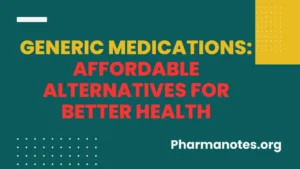Generic Medications: Affordable Alternatives for Better Health

Introduction to Generic Medications
In the realm of healthcare, the term “generic medications” often arises, but what exactly do we mean by it? Essentially, generic medications are copies of brand-name drugs that have the same dosage, intended use, effects, side effects, route of administration, risks, safety, and strength as the original drug. They provide a more affordable alternative to their branded counterparts, making essential medications accessible to a broader population.
Understanding Generic vs. Brand Name Medications
It’s crucial to grasp the distinction between generic and brand-name medications. While brand-name drugs are developed and patented by pharmaceutical companies, generic drugs are produced once the patent has expired. However, this doesn’t mean they are inferior. In fact, the FDA regulates generic drugs to ensure they meet stringent quality, purity, and potency standards.
Cost-Effectiveness of Generic Medications
One of the most significant advantages of generic medications is their affordability. On average, generic drugs cost 80-85% less than their brand-name counterparts, saving consumers and healthcare systems billions of dollars annually. This cost-effectiveness stems from various factors, including lower research and development costs and competition among manufacturers.
Quality and Safety of Generic Medications
Despite their lower price tags, generic medications undergo rigorous testing and scrutiny by the FDA to ensure they are bioequivalent to their brand-name counterparts. This means they must deliver the same amount of active ingredient into the bloodstream within the same timeframe. As a result, patients can trust that generic drugs are just as safe and effective as their branded counterparts.
Common Misconceptions about Generic Medications
There are several misconceptions surrounding generic medications, such as concerns about their efficacy and safety. However, studies have consistently shown that generic drugs perform just as well as brand-name drugs in terms of therapeutic effects. It’s essential to debunk these myths and educate consumers about the benefits of generic medications.
Availability and Accessibility
Generic medications are widely available and accessible across the globe. They play a crucial role in healthcare systems, particularly in developing countries where access to affordable medications can be limited. By providing cost-effective alternatives, generic drugs help improve health outcomes and save lives.
Prescription and Over-the-Counter (OTC) Generic Drugs
Another advantage of generic medications is their availability without a prescription. Many common over-the-counter drugs, such as ibuprofen and acetaminophen, are available in generic form, allowing consumers to save money without sacrificing quality. Additionally, a wide range of prescription medications have generic equivalents, offering patients more affordable treatment options.
Patient Education and Awareness
Empowering patients with knowledge about generic medications is key to promoting their acceptance and usage. Healthcare professionals play a crucial role in educating patients about the safety and efficacy of generic drugs, helping them make informed decisions about their healthcare. There are also numerous resources available to help consumers understand the benefits of generic medications.
Promoting Acceptance and Trust
Building trust in generic medications requires ongoing efforts to educate healthcare professionals and the public about their quality and safety. By highlighting the rigorous FDA approval process and the proven track record of generic drugs, we can instill confidence in their efficacy and reliability.
Government Policies and Regulations
Government policies and regulations play a significant role in shaping the generic drug market. Efforts to streamline the approval process and encourage competition among manufacturers can help drive down prices and increase access to essential medications. However, challenges such as patent laws and market exclusivity can hinder the widespread adoption of generic drugs.
Future Trends and Innovations
Looking ahead, advancements in generic drug development hold promise for improving healthcare outcomes and reducing costs. Innovations such as 3D printing and personalized medicine may revolutionize the way generic drugs are produced and prescribed, opening up new possibilities for personalized treatment options.
Challenges and Limitations
Despite their many benefits, generic medications face challenges such as patent laws and regulatory hurdles that can limit their availability and accessibility. Addressing these challenges will require collaboration between governments, pharmaceutical companies, and healthcare professionals to ensure patients have access to affordable and high-quality medications.
Case Studies and Success Stories
Numerous case studies and success stories illustrate the positive impact of generic medications on healthcare outcomes. From lowering treatment costs for chronic conditions to improving access to life-saving drugs in developing countries, generic medications play a vital role in promoting better health for all.
Conclusion
In conclusion, generic medications are essential components of modern healthcare systems, offering cost-effective alternatives to brand-name drugs without compromising quality or safety. By educating patients and healthcare professionals about the benefits of generic medications and addressing misconceptions, we can promote their acceptance and usage, ultimately improving health outcomes and reducing healthcare costs.
FAQs
- What exactly are generic medications? Generic medications are copies of brand-name drugs that have the same dosage, intended use, effects, side effects, route of administration, risks, safety, and strength as the original drug.
- Are generic drugs as effective as brand-name drugs? Yes, generic drugs are just as effective as brand-name drugs. They undergo rigorous testing by the FDA to ensure they are bioequivalent to their branded counterparts.
- How can I find out if there’s a generic version of my medication? You can ask your healthcare provider or pharmacist if there is a generic version of your medication available. They can provide information about generic alternatives and help you make informed decisions about your healthcare.
- Are generic medications always cheaper than brand-name drugs? Yes, on average, generic medications cost 80-85% less than brand-name drugs. This cost savings is due to lower research and development costs and competition among manufacturers.
- Can I switch from a brand-name drug to a generic one? In many cases, yes. Your healthcare provider can help you determine if switching to a generic medication is appropriate for your specific medical condition and treatment plan.
Also, Visit:
B. Pharma Notes | B. Pharma Notes | Study material Bachelor of Pharmacy pdf